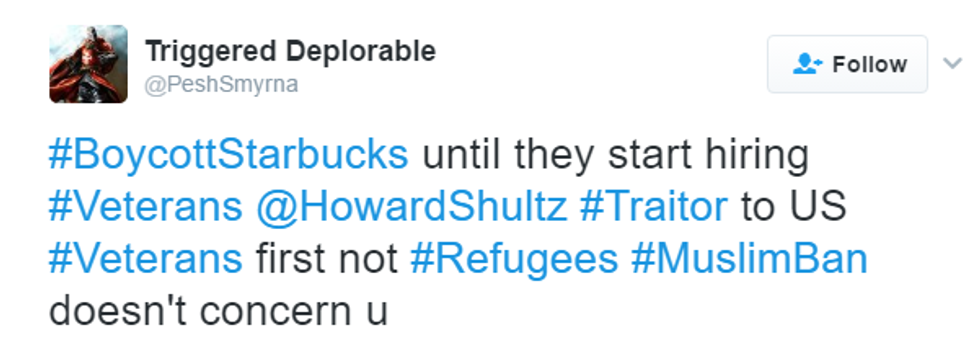What happens when you mix a well-established business with a group of people who think boycotting coffee will make their voices heard? You get Starbucks.
Starbucks has been the center of controversy for the past two holiday seasons. Their red (and green) cups have been a focal point opponents of political correctness, causing quite a few boycotts over recent. And now, with Trump's immigration ban, we're bearing witness to another one.
Starbucks' CEO, Howard Schultz, made the courageous decision to hire 10,000 refugees worldwide over the next five years in the wake of Trump's indefinite ban on Syrian refugees. The choice has sparked outrage by people "who said the company should focus on hiring American workers." So, naturally, Twitter got angry.
I can't help but wonder, though, if the boycott is really rooted in the lack of hiring veterans. In 2013, Starbucks made the same type of promise to hire at least 10,000 military veterans and active-duty spouses. So far, they've hired around 8,000. Looks like they're already working on hiring those veterans. So, what's your next argument? (Or, more accurately, what's your real argument?)
In a recent press release, Schultz said, "we have a long history of hiring young people looking for opportunities and a pathway to a new life around the world. This is why we are doubling down on this commitment ... There are more than 65 million citizens of the world recognized as refugees by the United Nations, and we are developing plans to hire 10,000 of them over five years in the 75 countries around the world where Starbucks does business.
"And we will start this effort here in the U.S. by making the initial focus of our hiring efforts on those individuals who have served with U.S. troops as interpreters and support personnel in the various countries where our military has asked for such support."
Starbucks' plan still has a military focus, even though it isn't on veterans this time. If the people supporting the boycott were really in it for support of the veterans and the military, a quick read through of the actual plan would have lessened their anger.
Luckily for Starbucks, they're used to so-called boycotts — and used the lack of effect that the boycotts have on their business.
The initial red cup controversy, referred to as "cup-gate," happened in 2015 when Starbucks debuted their holiday cup: a blank red canvas. The cup was initially designed "to be a blank canvas for customers to create their own stories." Unfortunately, many people didn't see it that way. They decided that Starbucks joined the #WarOnChristmas, and so began a boycott.
Even Mr. Trump, having a Starbucks in Trump Tower, weighed in on the controversy:
"No more 'Merry Christmas' at Starbucks. No more ... Maybe we should boycott Starbucks. I don't know. Seriously. I don't care. By the way: That's the end of that lease. But who cares? Who cares? Who cares?"(For those curious, there is still a Starbucks in Trump Tower.)
Starbucks couldn't win in 2016, either, when it released a special green cup. Since it was released prior to their annual red cup, many considered it to further the #WarOnChristmas, sparking another boycott — but the green cup wasn't holiday-related at all. It was designed to represent unity.
"During a divisive time in our country, Starbucks wanted to create a symbol of unity as a reminder of our shared values, and the need to be good to each other,” Schultz said in a press release.
Meanwhile, Starbucks was preparing to release the real holiday cup, featuring designs made by actual customers. Customers have been drawing designs on white cups for years. So in December of 2015 (after the initial controversy), Starbucks took it a step further and asked customers to share their designs on Instagram.
Green cup boycott aside, what we've seen is that Starbucks is capable of using controversy and a boycott to its advantage — and that's exactly what's going to happen this time.
I, and many others who oppose the immigration ban, fully support Starbucks' decision to hire refugees worldwide. I can personally guarantee that, in light of this, I will be giving Starbucks more of my business. It's a bold stance to take on such a controversial issue, especially when your business decision goes against what the president of the country is trying to do.
Starbucks: I respect you. I support you. I stand with you.





















